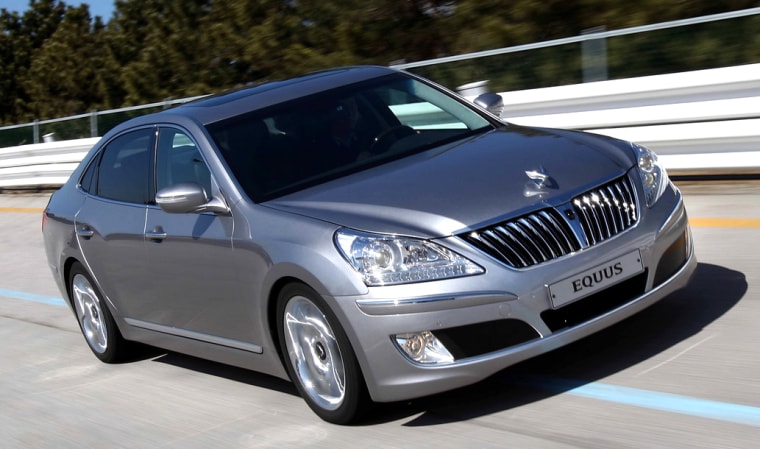Its very name has long been synonymous with “cheap,” yet the South Korean carmaker, Hyundai Motors, is taking aim at some of the most lavish and costly segments of the automotive market.
Hoping to build on the success of its up-market Genesis sedan, which was named North American Car of the Year last January, Hyundai is getting ready to roll out an even more luxurious sedan, dubbed Equus, which will target some of the toughest — and highest-priced — competitors in the automotive market, including Mercedes-Benz, BMW, Audi and Lexus.
But will buyers be willing to trade in their S-Class and 7-Series sedans for a new, $60,000 car that will be sold alongside more plebeian products, such as the $10,000 Hyundai Accent? Apparently Hyundai believes they will, based on the unexpected success of the Genesis sedan, which nudged the company’s products into the $40,000 range for the first time.
“We’re a lot more positive about Equus than we were when we were getting ready to launch Genesis,” says Hyundai America’s marketing chief, Joel Ewanick.
But within the South Korean company, there were skeptics who didn't understand how Hyundai could enter the luxury market when its traditional marketing emphasized rock-bottom pricing. Yet in some ways that turned around when the Genesis sedan, targeted at the mid-luxury Mercedes E-Class level, hit the market.
Though many of the 50-member North American Car of the Year jurors — of which, in full disclosure, I am one — felt the four-door wasn’t quite best-in-segment, the tremendous leap Hyundai took was enough to sway the vote, with the Genesis sedan narrowly nudging past the Ford Flex “people mover” in January’s vote.
Hyundai certainly had a good story to tell. Long lingering at the bottom of the quality charts, it has, in recent years, climbed into the upper strata, along with long-time leaders Lexus and Porsche. Savvy marketing campaigns also helped, such as the Hyundai Assurance program, designed to protect customers who might lose their job after buying one of its new cars.
Only a few years ago, less than one in five American motorists would even consider a Hyundai product, according to a variety of industry surveys. By the time of the Genesis launch, that had risen to one in four. And more recently, the carmaker claims, the “consideration factor” has nudged close to 40 percent, ahead of domestic makers GM and Chrysler, as well as many mid-line Asian makers.
That change in public attitude started to entice Korean planners, who had begun working on several products even more upscale than Genesis. Barely a year ago, there was no plan to bring any of those over to the U.S., according to Hyundai America CEO John Krafcik. Then the company decided to test the waters by revealing a concept version of Equus at the New York Auto Show in April.
With unexpectedly positive feedback from the show, and subsequent consumer clinics, “We built confidence we can take this to another level," Ewanick says.
A running prototype of the Equus reveals a car that is definitely a step above Genesis when it comes to classic luxury touches. The car is roughly half a foot longer than Genesis, most of it going toward the cavernous back seat. The sedan is swathed in leather, the cabin featuring plenty of requisite hand-rubbed wood. All windows, front and back, use laminated glass designed to block out all but the loudest exterior noises.
The interior features all the expected technology, such as a large LCD monitor in the center stack for navigation and other features including a first-of-its-kind forward-looking video camera.
Under the hood, Equus will share the 4.6-liter V-8 found in the topline Genesis model. Performance is part of the price of admission in the premium-luxury segment, Hyundai officials note. When the American version is ready, they promise it will have the handling and road feel somewhere between the soft Lexus LS460 and the more Teutonic Mercedes-Benz S550.
Will buyers believe that a Hyundai can really compete with such benchmark brands? Company officials note that they’ve been taking plenty of Mercedes and BMW trade-ins for the Genesis. But they also concede that there’s a big difference when a manufacturer tries to stretch from mid-luxury models like the E-Class to the elite and rarefied S-Class.
So far, “Nobody’s been able to run the gamut from entry cars, like Accent, all the way up to the highest levels of luxury,” echoes analyst Dan Gorrell of the consulting firm Autostrategem, in North Tustin, Calif. “People who buy these cars are likely to look down on their nose at traditional Hyundai buyers, and I can’t even imagine them willing to share the same showroom.”
Hyundai officials admit that will be a particular challenge and hint that they are looking at alternatives. One possibility would be to create a sort of “showroom-within-a-showroom,” says Ewanick, open only to Equus customers. And even then, he adds, only one in four of Hyundai’s current, best dealers will be allowed to distribute the new model.
Another alternative might be to approach top-line customers directly at home or in the office, or just about anywhere else that might suit them, rather than bringing them into a showroom.
Hyundai will have to move fast — the launch of Equus comes early next year. But for now, Hyundai is holding down expectations, suggesting it only intends to import about 2,000 of the big sedans annually.
And if Equus hits that target? For now, insists Ewanick, there are no plans to bring any other Hyundai luxury cars to the states. Nor does the carmaker intend to set up a separate luxury channel, like Toyota’s Lexus division, but “we haven’t ruled that out,” the marketing executive adds.
One thing is certain, Hyundai doesn’t plan to abandon mainstream products like the Accent, Elantra or Santa Fe. “We know end of the day [that if our core products aren’t successful,’ says Ewanick, “Equus won’t matter.”
